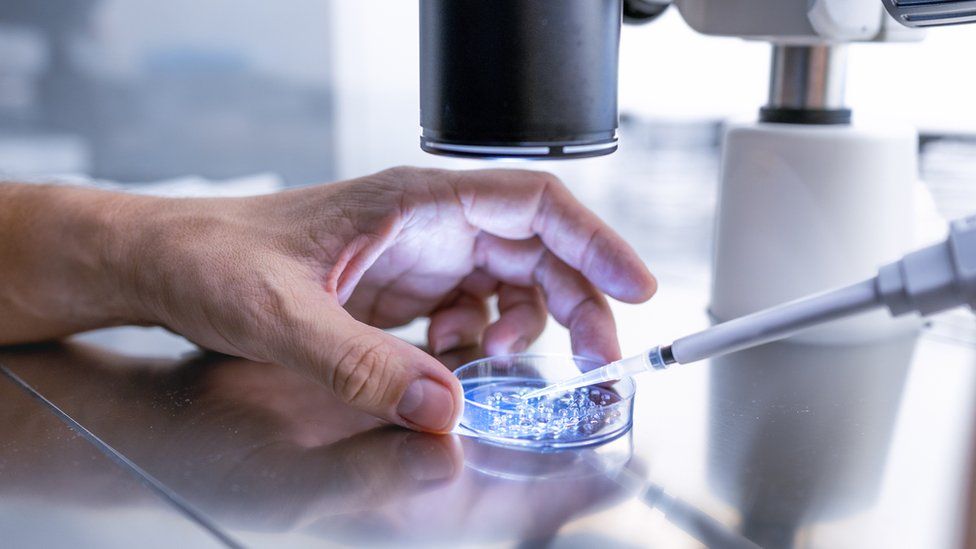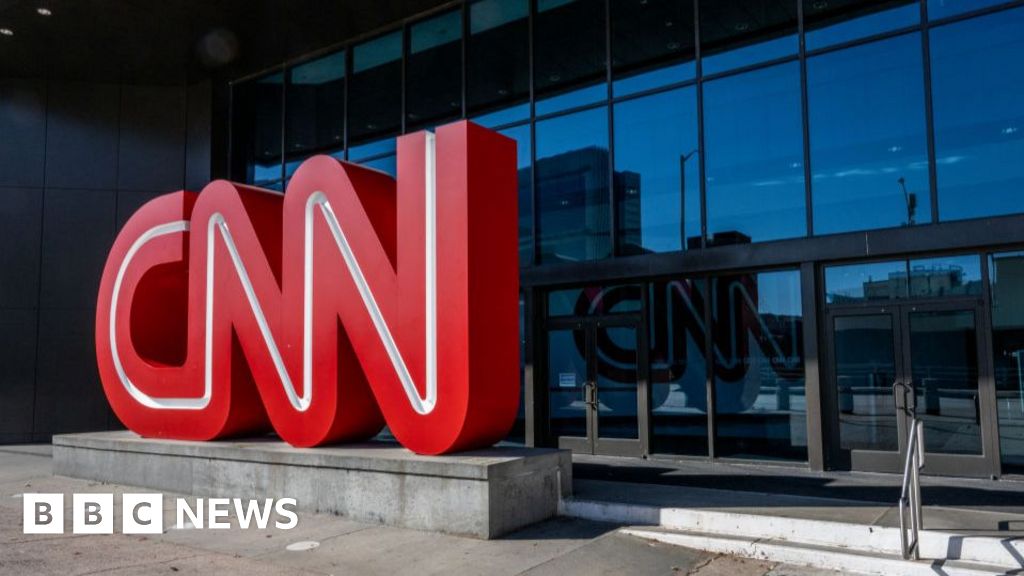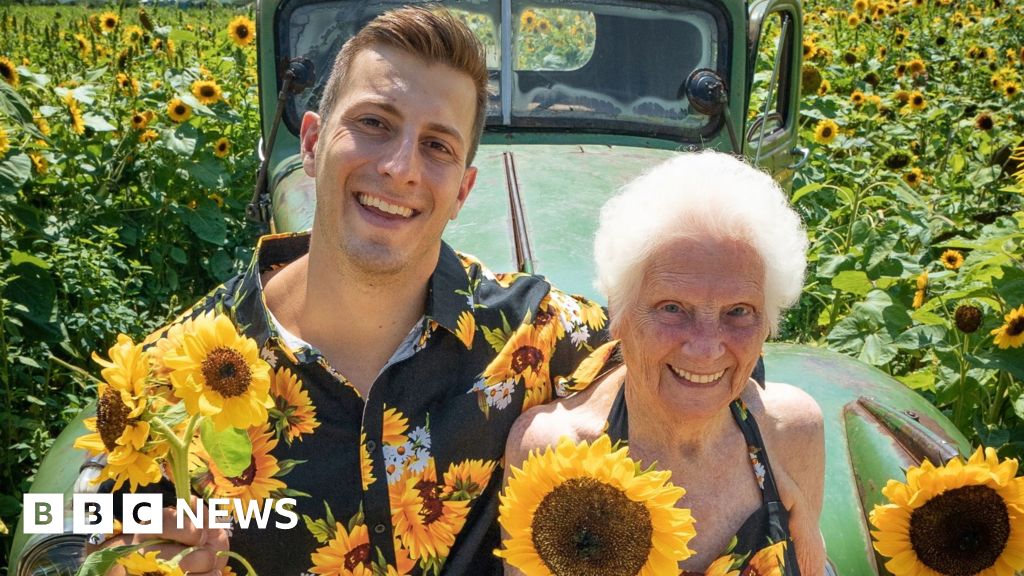ARTICLE AD BOX
 Image source, Carlos Duarte
Image source, Carlos Duarte
In vitro fertilization is a common form of fertility care in the US.
A ruling from the Alabama Supreme Court that frozen embryos are considered children, and that a person could be held liable for accidentally destroying them, has opened up a new front in the US battle over reproductive medicine.
A major fertility clinic in the southern US state has paused its in-vitro fertilisation (IVF) services in the wake of the decision, over fears it could expose them to criminal prosecution.
The University of Alabama Birmingham said it would continue retrieving eggs from women's ovaries. But it said it would halt the next step in the IVF process, in which the eggs are fertilised with sperm before being implanted into the uterus.
"We are saddened that this will impact our patients' attempt to have a baby through IVF," the University of Alabama Birmingham, which has one of the state's leading medical facilities, said in a statement.
"But we must evaluate the potential that our patients and our physicians could be prosecuted criminally or face punitive damages for following the standard of care for IVF treatments."
Medical experts and reproductive advocacy groups warned the ruling could have negative consequences for fertility treatments in Alabama and beyond.
Conservative groups welcomed the Alabama ruling, arguing that even the tiniest embryo deserves legal protection.
Why did this lawsuit occur and what did the court rule?
The case stems from a wrongful death lawsuit brought by three couples whose embryos were lost at a fertility clinic in 2020.
A patient had wandered into the place where the embryos were stored, handled them, and accidentally dropped them. As a result, the embryos were destroyed.
The couples sought to sue the Center for Reproductive Medicine and the Mobile Infirmary Association, under the state's Wrongful Death of a Minor Act. That law covers foetuses, but did not specifically cover embryos resulting from the in-vitro fertilisation process.
A lower court had ruled that the embryos did not qualify as a person or child, and that a wrongful death lawsuit could not move forward.
The Alabama Supreme Court then took up the question of whether the law applied here.
This week, it sided with the couples, but also said in last Friday's ruling that embryos were considered "children".
The wrongful death law applied to "all unborn children, regardless of their location", the decision states.
It referred to the embryos, which are often stored in cryogenic freezers, as "extrauterine children".
Concurring with the majority opinion, Chief Justice Tom Parker wrote: "Even before birth, all human beings have the image of God, and their lives cannot be destroyed without effacing his glory."
What are the implications for Alabama fertility patients?
The ruling does not ban or restrict IVF.
In fact, the couples who brought the case actively sought out the procedure.
But the decision may cause confusion about whether some aspects of IVF are legal under Alabama law, experts say. If an embryo is considered a person, it could raise questions about how clinics are allowed to use and store them.
Elisabeth Smith, director of state policy at the Center for Reproductive Rights, told the BBC in a statement: "Not all [IVF] embryos are used, nor can they be.
"To enact legislation granting legal personhood to embryos could have disastrous consequences for the use of IVF - a science many people rely on to build their families."
Ambiguity over the law could also extend to patients themselves, who may worry about whether the procedure remains available or legal.
The Medical Association of the State of Alabama said in a statement: "The significance of this decision impacts all Alabamians and will likely lead to fewer babies - children, grandchildren, nieces, nephews, and cousins - as fertility options become limited for those who want to have a family."
How does this tie in with the US abortion debate?
When the US Supreme Court struck down a nationwide right to abortion in 2022, it opened the door for states to make their own laws on the issue.
Since the decision, Democratic-controlled states have expanded access while Republican-controlled states have restricted it.
Alabama already has a total ban on abortion, at all stages of pregnancy.
The White House drew an explicit comparison with abortion rights in a statement this week, calling the Alabama ruling "exactly the type of chaos that we expected when the Supreme Court overturned Roe v Wade and paved the way for politicians to dictate some of the most personal decisions families can make".
Abortion opponents are also watching this ruling closely. The question of when an embryo or a foetus is legally considered a person is a factor in many state abortion restrictions.
The Alliance Defending Freedom, a conservative Christian legal group, welcomed the Alabama ruling as a "tremendous victory for life".
"No matter the circumstances," spokeswoman Denise Burke said in a statement to the BBC, "all human life is valuable from the moment of conception.
"We are grateful the Court correctly found that Alabama law recognises this fundamental truth."
Other anti-abortion activists said IVF was not so clear cut an issue ethically for them as terminating a pregnancy.
Eric Johnston, a lawyer who helped draft Alabama's constitutional language on abortion in 2018, told the BBC: "By and large the pro-life community would say that fertilised eggs are in need of protection."
But he acknowledged there are anti-abortion couples who have used IVF and said he would never condemn them.
"It's a dilemma, and a dilemma is something where you don't have a satisfactory answer," he added.
What could happen in other states?
US states often tend to replicate each other's legislation, and the US has seen this pattern play out with abortion. Often, states will take cues from each other about what laws or policies have successfully passed legislatures or withstood legal challenges.
Though the Alabama ruling only applies within the state, critics warned it could have similar ripple effects if other states attempt legislation, or other plaintiffs bring lawsuits, advancing the concept that frozen embryos should legally be considered children or people.
But analysts say it seems unlikely this particular case will end up at the US Supreme Court, as the issue of abortion did, because the Alabama ruling originated in state court and not the federal system.
According to the Centers for Disease Control, 97,128 babies were born in the US as a result of IVF treatments in 2021.
How could this ruling affect US politics?
Abortion rights has been a winning issue for Democrats since the US Supreme Court overturned Roe v Wade, which guaranteed the constitutional right to abortion up to the point of foetal viability, about 23-25 weeks.
Democratic candidates up and down the ballot could now run on platforms of protecting access to fertility treatment across the United States.
Republican politicians, meanwhile, often side with religious conservatives who want abortion banned or limited in the US.
Republican presidential candidate Nikki Haley endorsed the Alabama Supreme Court's decision on Thursday.
"Embryos to me, are babies," she said. "When you talk about an embryo, you are talking about, to me, that's life and so I do see where that's coming from when they talk about that."

 10 months ago
54
10 months ago
54








 English (US) ·
English (US) ·